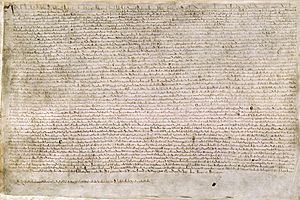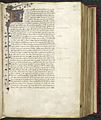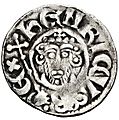Magna Carta facts for kids
The Magna Carta was a very important document signed in 1215 by King John of England. He signed it after talking with his powerful noblemen, called barons, and their allies from France and Scotland. This happened at a place called Runnymede in Surrey, England.
The name "Magna Carta" comes from Latin and means "Great Charter." It created a group of 25 barons whose job was to make sure King John followed the rules. These rules included getting fair and quick justice, needing approval from a council for new taxes, limiting military payments, and protecting people from being put in prison without a good reason.
King John was forced to sign the charter, so he asked Pope Innocent III, his spiritual leader, to cancel it. The Pope agreed, calling it "shameful and unfair." However, the Magna Carta is still seen as one of the most important documents ever written. It has greatly influenced how we think about justice and freedom, and it has shaped laws around the world.
The Magna Carta has affected English law right up to today. It is one of the most famous documents in the History of England. It is known as a key part of the idea that citizens should have liberty and rights.
Contents
What is in the Magna Carta?
The Magna Carta has 63 rules, or clauses, written in Latin on parchment (a type of animal skin used for writing). Only three of these original rules are still part of the law today. One rule protects the freedom and rights of the English Church. Another confirms the special freedoms and traditions of the City of London and other towns.
The most famous rule (translated from Latin) is why the Magna Carta is still so well-known:
"No free person shall be arrested, imprisoned, or lose their rights or belongings. They will not be sent away from the country. We will not use force against them unless a group of their equals judges them fairly, or if the law of the land allows it. We will not sell, deny, or delay justice or rights to anyone."
This rule was very important because it limited the power of rulers. It introduced the idea of a fair legal process and the idea of a jury (a group of people who decide if someone is guilty). The BBC summed up the main points of the document:
- No one is above the law, not even the king.
- Everyone has a right to a fair trial.
- No new taxes without people agreeing to them.
The BBC said the Magna Carta "set up many important ideas that have been copied worldwide." It even inspired the U.S. Constitution and the Universal Declaration of Human Rights.
How the Magna Carta Started
The Magna Carta came from the medieval system called feudalism. In this system, the King's word was usually the law. The document helped solve a big conflict between King John and his powerful noblemen and bishops. They were arguing about taxes and disagreements with the Pope.
The barons decided to pressure King John when he was weak. John had lost a battle against the French. He had also been excommunicated (kicked out of the church) by the Pope from 1209 to 1213. He was also worried about a civil war at home.
So, in June 1215, he met the barons at Runnymede, about 20 miles southwest of London. The negotiations were managed by John's half-brother, William Longspée, and Stephen Langton, the Archbishop of Canterbury.
The Magna Carta was created to balance the power between the King and his people, especially between John and the barons. When King John put his seal on the Magna Carta, he agreed to a basic idea: even a king is not above the law. This meant kings would not have as much power as they did before. The charter also set rules for inheritance (passing on property). It said that people could not be put in prison without a proper legal process. In short, the king had to follow the law.
Copies of the Magna Carta
At least thirteen original copies of the 1215 charter were made by the King's office, called the royal chancery. Seven were sent out on June 24, and six more later. They went to local officials (sheriffs) and bishops. There are small differences between the copies that still exist, meaning there wasn't one "master copy."
Only four of these original documents still survive today, all in England:
- Two are at the British Library.
- One is at Salisbury Cathedral.
- One belongs to Lincoln Cathedral and is on display at Lincoln Castle.
Each of these copies is slightly different in size and wording. Historians consider each one to be equally important and correct.
The two 1215 charters at the British Library were bought by a collector named Sir Robert Cotton in the 1600s. One was found by a lawyer in a tailor's shop. The other was found in Dover Castle. One of these copies was damaged in a library fire in 1731, and its seal melted. An engraved copy was made in 1733. Later, a bad cleaning attempt in the 1830s made the writing hard to read. This is the only surviving 1215 copy that still has its great seal attached.
Lincoln Cathedral's copy has been in that county since 1215. It was shown in the cathedral's main room and later moved. From 1939 to 1940, it was displayed in the British section of the 1939 World Fair in New York City. It was also shown at the Library of Congress. When World War II started, Winston Churchill wanted to give the charter to the American people. He hoped this would encourage the United States to join the war against the Axis powers. However, the cathedral did not agree, and the plan was dropped.
After December 1941, the copy was kept safely in Fort Knox, Kentucky. It was displayed again in 1944 and returned to Lincoln Cathedral in early 1946. It was put on display in 1976 in the cathedral's medieval library. It has also been displayed in San Francisco and Philadelphia. It is now on permanent loan to the David P. J. Ross Vault at Lincoln Castle.
The fourth copy is at Salisbury Cathedral. It was originally given to an older cathedral nearby in 1215. It was found again by the cathedral in 1812. It has stayed in Salisbury for most of its history, except for times when it was taken away for repair. It is probably the best-preserved of the four. Its handwriting is different from the others, suggesting it was written by someone at the cathedral, not a royal writer.
Important Rules Still in Law
Only three rules from the Magna Carta are still part of the law in England and Wales today. These rules are about: 1. The freedom of the English Church. 2. The "ancient freedoms" of the City of London (rule 13 in the 1215 charter). 3. The right to a fair legal process (rules 39 and 40 in the 1215 charter).
Here are these rules, using the numbering from a later version of the charter (1297):
- Rule 1: We have given to God, and by this Charter we confirm, for us and our future kings forever, that the Church of England shall be free. It shall have all its rights and freedoms completely safe. We have also given to all the free people of our kingdom, for us and our future kings forever, these freedoms written below, for them and their future generations to have and to hold from us and our future kings forever.
- Rule 9: The City of London shall have all the old freedoms and customs it has always had. Also, we want and grant that all other Cities, Towns, and the noblemen of the Five Ports, and all other Ports, shall have all their freedoms and free customs.
- Rule 29: No free person shall be arrested or imprisoned, or lose their property, freedoms, or free customs. They will not be outlawed or sent away from the country, or harmed in any other way. We will not act against them or judge them, except by a lawful judgment of their equals, or by the Law of the land. We will not sell justice to anyone, nor will we deny or delay justice or rights to anyone.
Images for kids
-
King John on a stag hunt
-
A painting of Pope Innocent III from his time
-
The Articles of the Barons, 1215, kept at the British Library
-
The Charter of the Forest re-issued in 1225, kept at the British Library
-
The 1225 version of Magna Carta issued by Henry III, kept in the National Archives
-
1297 version of the Great Charter, on display in the National Archives Building in Washington, D.C.
-
Magna Carta replica and display in the rotunda of the United States Capitol, Washington, D.C.
-
The Magna Carta Memorial at Runnymede. It was designed by Sir Edward Maufe and built by the American Bar Association in 1957.
-
A 1297 copy of Magna Carta, owned by the Australian Government and on display in the Members' Hall of Parliament House, Canberra
-
King John holding a church, painted around 1250–1259 by Matthew Paris
See also
 In Spanish: Carta Magna para niños
In Spanish: Carta Magna para niños
 | May Edward Chinn |
 | Rebecca Cole |
 | Alexa Canady |
 | Dorothy Lavinia Brown |
















